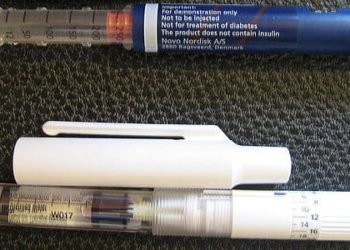#VisualAbstract: An Anti-CD3 Antibody, Teplizumab, in Relatives at Risk for Type 1 Diabetes
1. In relatives of patients with type 1 diabetes (T1DM) at risk for disease development, randomization to teplizumab delayed time to T1DM diagnosis compared to placebo treated patients.
2. Adverse events associated with teplizumab treatment included rash and transient lymphopenia.
Evidence Rating Level: 1 (Excellent)
Study Rundown: T1DM results from autoimmune destruction of insulin-producing beta cells. Before frank insulin production deficits or dysglycemia arise autoantibodies are produced in patients at risk for T1DM. The Fc receptor-nonbinding anti-CD3 antibody teplizumab has been shown to reduce loss of beta cells after the diagnosis of T1DM, and whether is can slow progression to diagnosis in at-risk patients is unknown. This phase 2 randomized controlled trial showed a significant delay until T1DM diagnosis in high risk patients compared to placebo treated patients. Adverse events of rash and transient lymphopenia were observed in the treatment group. T-cells associated with unresponsiveness and downregulation of autoimmune activity were more common in teplizumab treated patients than those in the placebo group.
This randomized controlled trial suggests possible first-in-class efficacy of teplizumab for prophylactic delay of T1DM onset in high risk patients. The study is limited by the small trial size and its generalizability towards people at risk for T1DM without diagnosed first degree relatives is unknown.
Click to read the study in NEJM
©2019 2 Minute Medicine, Inc. All rights reserved. No works may be reproduced without expressed written consent from 2 Minute Medicine, Inc. Inquire about licensing here. No article should be construed as medical advice and is not intended as such by the authors or by 2 Minute Medicine, Inc.

![No benefit with hydroxychloroquine (Plaquenil) over placebo in Sjogren’s Syndrome [JOQUER Trial]](https://www.2minutemedicine.com/wp-content/uploads/2014/07/Sjogren_syndrome_2-350x250.jpg)





